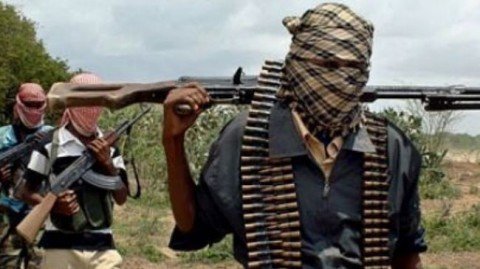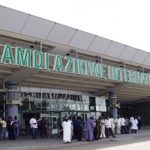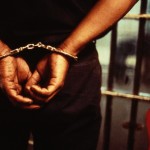Boko Haram: Amnesty International Accuses Nigeria Military Of Human Rights Violations
Featured, Latest Headlines Monday, March 31st, 2014
…Says I,500 Killed In Conflict In North-East In 3 MonthsAyo Balogun, Lagos
Amnesty International has accused the Nigeria’s Security forces of committing serious human rights violations in response to Boko Haram’s attack, claiming that over 1,500 people have been killed in the crisis in North-East this year alone.
In its report released on Monday, the international body says since the start of 2014, more than 1,500 people have been killed in north-eastern Nigeria as people are living in a climate of fear and insecurity, vulnerable to attack from Islamist armed group, Boko Haram on the one hand and facing human rights violations at the hands of the very state security forces which should be protecting them.
According to Amnesty International’s research, at least half of the deaths are civilians, killed in attacks by Boko Haram while more than 600 people, mainly former detainees, were killed by the security forces following the attack by Boko Haram on the military barracks in Maiduguri on 14 March.
“These killings amount to crimes against humanity and war crimes. Amnesty International is extremely concerned that Nigerian security forces and the Islamist armed group Boko Haram are committing serious violations of International Humanitarian Law (IHL) and human rights abuses amounting to war crimes and crimes against humanity.
“There have been hundreds of unlawful killings, including scores of extrajudicial executions, and deliberate attacks on civilians. Thousands of detainees have been victims of torture and other cruel, inhuman or degrading treatment or punishment. Nigeria’s security forces continue to commit serious human rights violations in their response to Boko Haram. Since 2009, thousands of people suspected of having links to Boko Haram have been extra-judicially executed or unlawfully killed by the Nigerian army and police,” it says.
Amnesty International’s research has also found that the security forces appear to have repeatedly used firearms against people when there is no imminent threat of death or serious injury and have intentionally used lethal force in circumstances other than when it was strictly necessary to protect life.
It says that in 2014, as attacks by Boko Haram intensified, the military has responded by stepping up its operations against Boko Haram camps in Borno state as in the first three months of the year, over 400 suspected Boko Haram members were killed in JTF raids and in firefights during Boko Haram attacks on towns while 38 civilians have also allegedly been killed by the military this year.
“In addition, at least 150 detainees died in military custody. On 19 March 2014, Amnesty International received information that the military had bombed Kayamla village, killing 10 civilians. According to one staff at the State Specialist Hospital who spoke to six wounded people from the village, the fighter jet launched series of bombs on the village after community people had given information to the army that some Boko Haram fighters fleeing Maiduguri after the attack on Giwa barracks had passed through the village. Many villagers sustained injuries.
“When Amnesty International spoke to the hospital staff on Wednesday 26 March 2014, he reported that two of the six wounded people have died in hospital from injuries sustained by fragments,” it explains.
Amnesty International says it has repeatedly urged the authorities to conduct thorough and independent investigations into the alleged human rights violations and abuses with a view to bringing suspected perpetrators to justice in a fair trial.
“Over the years, both State and Federal Governments have established inquiries into acts of violence including communal and sectarian violence in Nigeria’s middlebelt, unlawful killings, poor conditions in detentions and other instances of violations and abuses, but their findings and recommendations have mostly not been made public. Criminal investigations have been inadequate, with serious doubts over the quality of evidence against those arrested.
“In 2013, the committee set up by President Goodluck Jonathan to investigate and explore options for bringing an end to the on-going fighting in northern Nigeria submitted its report to the Presidency. The findings of the Committee’s report have not been made public. Following previous incidents of political, communal and sectarian violence, scores of people were rounded up by the police and security forces but few have been successfully prosecuted.
“According to information received by Amnesty International, previous commissions of inquiry into allegations of human rights abuses have named suspected perpetrators, yet very few people are aware of the content of these reports. In many cases, no criminal investigation is initiated on suspected perpetrators. Victims of violence have not received redress or reparation, including compensation, leaving people destitute and further stoking feelings of resentment and desperation,’ it adds.
The body states that victims and their families have a right to know the truth about the abuse of their rights including the identities of individuals or groups responsible for carrying out or ordering violations.
As such, Amnesty International is urging the international community, in collaboration with credible national civil society organisations and the National Human Rights Commission of
Nigeria, to set up an independent and international commission of enquiry with a mandate to investigate grave human rights abuses and violations that may constitute war crimes and crimes against humanity committed in north-eastern Nigeria.
Amnesty International says that given the serious and credible allegations that war crimes and crimes against humanity have been committed and Nigeria’s apparent unwillingness and inability to ensure justice and reparation for victims of crimes under international law, it is vital that the regional and international human rights bodies step up in ensuring that thorough, independent, impartial and transparent investigations are conducted. Nigeria should seek international assistance and advice in the conduct of these investigations and any subsequent prosecutions.
It recommends to the Nigerian authorities to take immediate and effective measures to guarantee the safety, security and protection of civilians and their properties in the affected communities and States, and in the entire country at large, and increase efforts to secure the lives and integrity of the persons of the civilian population in accordance with its regional and international human rights obligations.
It further recommends that the government must ensure that its security forces and members of the “civilian JTF” adhere strictly to their obligations under international human rights law and international humanitarian law, in particular, ensure that detainees are protected from extrajudicial executions, torture and other ill-treatment and are treated humanely at all times.
It urges government to provide unhindered access to the National Human Rights Commission and other human rights monitors to visit places of detention run by the military in Borno, Yobe and Adamawa states and initiates independent, impartial, and thorough investigations into allegations of unlawful killings and extrajudicial execution of former detainees from Giwa barracks following the 14 March, 2014 attack and seek the assistance of international experts in conducting these investigations while all the dead bodies in the mass graves in Dunomari should be exhumed with a view to conducting an independent autopsy by recognised Nigerian and international forensic pathologists to determine cause and circumstances of death.
“Government must invite and ensure unhindered and secure access, as a matter of urgency, to human rights monitors from the African Commission on Human and Peoples’ Rights and the UN to investigate violations and abuses committed by all parties to the armed conflict. They should ensure immediate, unhindered and secure access for humanitarian agencies to the displaced and other civilians in need of assistance,” it states.
Amnesty International also urges Boko Haram to immediately end deliberate attacks against civilians, schools and other civilian objects, and indiscriminate and disproportionate attacks and that it should publicly condemns, from the highest level of leadership, all unlawful killings and other human rights abuses and violations of international humanitarian law committed by their forces.
Related Posts
Short URL: https://www.africanexaminer.com/?p=9706






















